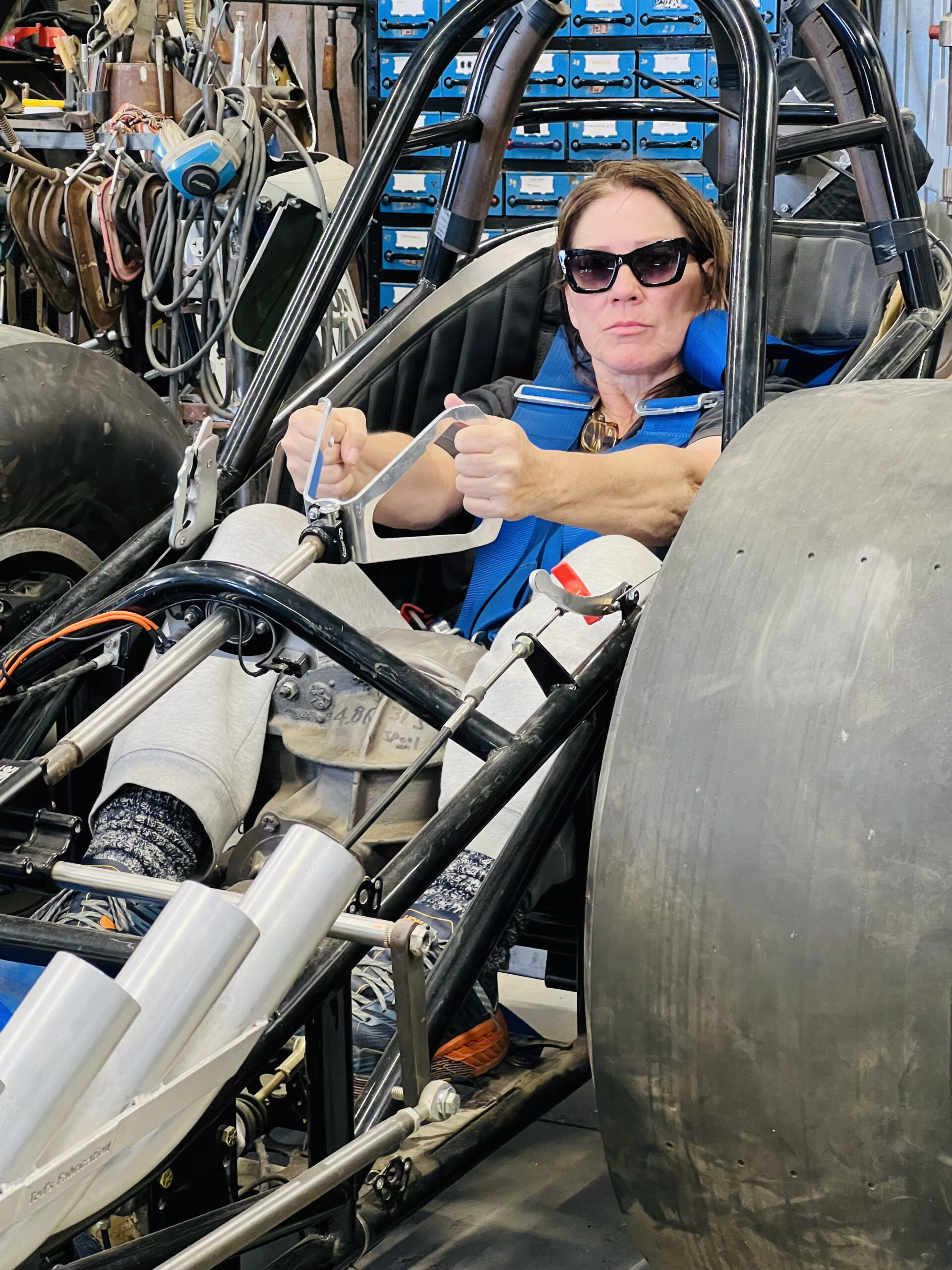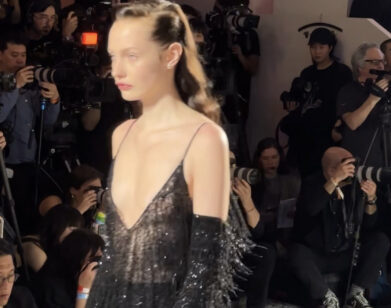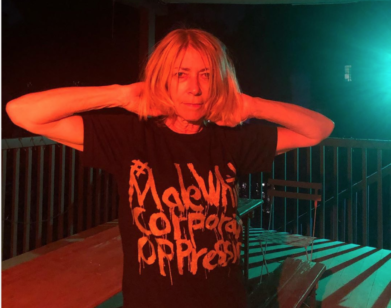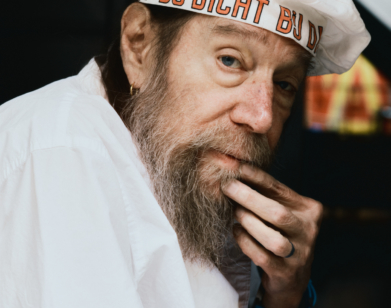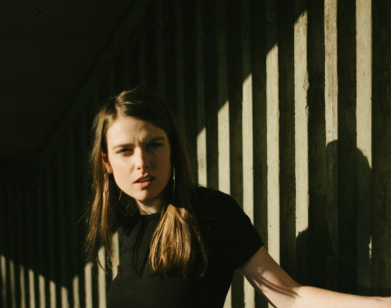KIM SQUARED
Kim Deal Tells Kim Gordon Why Contemporary Life Feels Like a Disaster Movie
From pop stars to politicians, this year has seen a lot of rebrands. In the latest and greatest, the legendary rock and roll frontman Kim Deal just branched off from the familiar to drop her first solo project, Nobody Loves You More, an eclectic and emotionally rich album that holds its own against any Breeders or Pixies fan favorites. And few know more about versatility than her fellow indie darling Kim Gordon. Nearly two decades after the two music icons chatted for Interview’s November 1995 issue, where they were already getting their flowers for marrying alt-rock with the mainstream, they got back together, this time over Zoom, to talk jam sessions, Yoko Ono poems, Appalachian roots, and dystopian futures.
———
KIM GORDON: Hey, Kim.
KIM DEAL: Hi, Kim. How’s L.A.?
GORDON: You know, sunny.
DEAL: So great. It’s 53 right now and rainy here. I’m thrilled.
GORDON: Wow, I actually wish it would rain here.
DEAL: Yeah, that would be nice. Do you like living in L.A. now?
GORDON: I really like my house and neighborhood. If my house could be in New York, that’d be ideal. But I grew up here, so it’s not as strange for me as it would be for other people.
DEAL: Yeah.
GORDON: Anyway, are you on a press tour?
DEAL: No, I’m just home. I did do a press tour, but now I’m just doing some interviews.
GORDON: Well, I do have a question about your record. What’s the difference in how you go about writing songs for The Breeders versus your solo records?
DEAL: That never occurs to me. The only thing that occurs to me is like, “I haven’t played a keyboard in a while. I’m going to put it through the Marshall and see if anything sounds cool.” I’ll usually drum first. Sometimes it sounds good, other times I need somebody like Britt Walford from Slint or Jim MacPherson. He learned on the drum line in high school marching band, so where some people are going to be late on a snare, he’s going to be right on top of the beat and very exciting.
GORDON: Yes, and you basically write the songs in The Breeders?
DEAL: Oh, no. I start by myself.
GORDON: Yeah, that’s what I mean. And then Josephine finds her parts?
DEAL: Josephine lives in New York City, so she’s the last to come in. Jim could ride his bike to my house, so his drums are always set up there. If what I’m doing sounds cool, Jim will come over, listen to what I played, and we’ll start with that. Right away we know if there’s something better. He does something better or I’ve got a better idea. Then Kelly comes over and does stuff, and if we get a couple cool sounding templates, then Jo comes in and writes a bass line. Sometimes the bass line is sort of there if it’s simple, but she’ll add stuff to it anyway.
GORDON: Yeah.
DEAL: What about you? That’s the analog way, with musicians coming in and playing actual instruments. What’s it like working in the box?
GORDON: Well, working with Justin [Raisen], we’d talk about beats or hip hop songs I like, then he’d come up with some fucked-up sounds and send them to me. I’d put down improvised dissonant guitars, do vocals, then he’d shape it. In Sonic Youth, Thurston would bring in a riff and we’d make our parts to it while playing, or we’d come up with stuff jamming in an organic way together.
DEAL: Was your bass tuned regular through most of this or did you use weird tunings?
GORDON: No, it was the only thing in regular tuning. I never really learned how to play bass. I always just listened and figured out notes.
DEAL: Steve Albini gave me a ukulele as a gift because I played in his wedding. I wrote a song on it, but I can’t really play ukulele. I just know the song I played. If you told me to play a D chord, I wouldn’t know. It’s weird, isn’t it?
GORDON: Yeah. So I know you were in Florida during the pandemic when you started working on songs. I don’t want to make you repeat things you’ve said in interviews, but is there anything you haven’t said that you want to?
DEAL: Let’s see. It’s interesting you mentioned the guy you work with, Justin, because there was one beat you mentioned liking. Kyle [Rector] specifically liked that. He’s an old B-boy, so he knew the guy you were talking about.
GORDON: Yeah, I like to start with rhythm because my singing is pretty limited. I use rhythm rather than melody.
DEAL: Do you know The Savages?
GORDON: I’ve heard of them.
DEAL: The rhythm section peeled off and did something called 180dB. They did a cover of a Tricky song called “Road Trip” with Meredith Graves and Nick Zinner. I really liked that song. I think they heard I liked it, because they sent me a rhythm and I thought it was fun to receive a track and start building guitars and stuff on it. That’s “Big Ben Beat” on the album.
GORDON: Oh, cool.
DEAL: Yeah, it’s a beat from the girls in London. It’s a big beat. It’s sweeping the nation. It’s cute. That turned out good, and that’s one of the main reasons I even started learning Pro Tools.
GORDON: Okay, I’ll go back and look through it.
DEAL: I still don’t like how live drums sound recorded digitally, though. It doesn’t sound good to me.
GORDON: Right. You always have great sounds on your records.
DEAL: Steve has that. Have you been to Electrical Audio Studios? Do you ever go to Chicago?
GORDON: I do, but I don’t usually go there.
DEAL: He has a good drum room. Do you have a recording setup in your house or do you go somewhere?
GORDON: I go to Justin’s. I have a couple amps in my office and I’ll sit and play. I sometimes record stuff in the shittiest way and send it to him.
DEAL: Can you use Logic or anything?
GORDON: No. I record it on voice memo.
DEAL: That’s what I was doing.
GORDON: I haven’t played bass in years, but I recorded a quick bass line that I sent him for “Bangin’ on the Freeway.” It already had all these other basses on it because his sister-in-law plays bass and he put them on. I said, “Okay, but can you chop all that up?” It was kind of satisfying just to record in the shittiest way and send it, knowing he is going to do stuff to it.
DEAL: Right.
GORDON: It was strangely gratifying. I have a friend who’s a really eccentric Japanese performance artist, and he had this big show in Japan. I’d collaborated with him in the past, and one involved Yoko Ono. He was going to have this Yoko Ono element in the show. Have you seen her book Grapefruit?
DEAL: No.
GORDON: It’s a conceptual Fluxus book that came out maybe in the late ’60s or early ’70s. I don’t know if you know what Fluxus is, but it’s very conceptual. She has 45 of these instructional painting things. They’re almost like minimalist poetry. Ei wanted me to make musical interpretations of them.
DEAL: Oh, that’s cool.
GORDON: I went to Justin’s, and there were 45 of them. He’d never done anything that was just an art thing, so it changed his thinking about how we should record next time. We’re going to do a different strategy. At one point, I was using a broom or brush on a guitar. When you have to make 45 things in a day, you try everything.
DEAL: Oh, I’ve just looked [the book] up. It’s really cute. Mostly writing.
GORDON: Yeah, it’s instructional. They’re conceptual, so it’s very free, making up sounds or music for it. There’s no right way, basically.
DEAL: What did your parents do? Were they in the arts?
GORDON: No, academics. My dad was a sociologist in education, and my mom made these eccentric clothes, like Afghans and kaftans, out of interesting fabric. She’d have open houses. I always wanted her to do more artistic things, but she basically just became a tailor.
DEAL: Can you sew?
GORDON: Oh, no. I learned how, but I was always breaking my mom’s sewing machine needles taking in my jeans. She grew up during the Depression, so she either made all my clothes or bought them at thrift stores.
DEAL: My dad was a Depression-era kid.
GORDON: What did your dad do again?
DEAL: He was from Appalachia, West Virginia. The whole family is from there. Kelly and I are the only ones born in Ohio.
GORDON: Do you still have relatives there?
DEAL: Yeah, everybody is in West Virginia. We go back for Thanksgiving, but my parents passed.
GORDON: Right.
DEAL: Everybody worked in the coal mine. My mother grew up in a coal mining camp, American Coal Mine. They had the company store they’d go to. My dad worked in the coal mine too. He lost part of his teeth when something hit him and he passed out on the swing. He could have—
GORDON: Wow.
DEAL: Yeah, but then he went to Korea and got the vet package to go to college. He graduated and taught mathematics at Marshall University. Then Wright-Patterson Air Force Base was looking for physicists and engineers, so he went to Dayton, Ohio and worked there for decades as a civilian.
GORDON: Cool.
DEAL: He was sort of warmonger-y, though, if you look at what he worked on. Once I started really reading about it, it’s all guidance systems, and not the kind for sending love.
GORDON: Right, missile guidance.
DEAL: But at the same time, something he worked on helped find downed pilots in Vietnam. So that’s a positive that came out of that.
GORDON: And it probably went into the GPS we all know and love.
DEAL: That’s right.
GORDON: I’m strangely looking forward to seeing what Trump has ushered in, the first billionaire government.
DEAL: An oligarch.
GORDON: Yeah. So many billionaires in his cabinet. I’m really interested to see what’s going to happen when they start implementing shit that affects the working class and the poor. I’m not going to delight in it, but it’s such a weird feeling to be sitting on the edge of something.
DEAL: It feels like we’re on the edge of a 1970s sci-fi sort of… Who was the guy who wrote all those books back in the day that always had a poignant ending showing humanity is a lost cause?
GORDON: Philip K. Dick?
DEAL: Maybe. He always had sadness at the end, because it’s all for naught. It feels like we’re at the beginning of a 1970s disaster movie, like The Poseidon Adventure or The Towering Inferno. Oh, we’re at the beginning of Soylent Green.
GORDON: Oh yeah, Soylent Green.
DEAL: We’re right at the precipice of that, it feels like. Thanks, Obama. It really did take just a little bit of time from Citizens United to be here. It was quick.
GORDON: There’s a really good podcast about the history of corruption in politics called The Master Plan. Starting with the Nixon era, I think, there’s one guy—I can’t remember his name right now—who was nominated to the Supreme Court. Everyone thought he was a very benign, moderate Republican, but he wrote this memo that was the outline for Citizens United and the Right’s takeover of government. It’s fascinating. David Sirota is one of the hosts. They spent like five years investigating. Even if you just listen to the first two or three, you get the idea.
DEAL: Interesting. I’ll check that out. Another one like Soylent Green, Rollerball with Charlton Heston? Everybody tries to actually drive over people and they get points. It totally reminds me of what you’re talking about—entertaining the masses with brutal games where they kill each other so the billionaires can live at the top. That sounds like the movie we’re going to be in.
GORDON: Yeah. Or the Octavia Butler book, Parable of the Sower. I read that during the pandemic. She wrote it in the ’90s, and it takes place in 2024 actually, in Los Angeles during a total climate change catastrophe. People are running around taking a drug that makes them set themselves on fire and shoot people. It’s really fucked up. And people are on the freeway, which is empty, like a parade of people walking.
DEAL: That sounds awesome.
GORDON: It kind of inspired the tone of my record, I realized.
DEAL: Oh my god, that’s so killer. That’s great. I wrote down all the stuff you mentioned. I hadn’t heard a lot of it. And I’ll give you the link to Rollerball.
GORDON: Oh yeah.
DEAL: Have fun with that. All right. Here’s my dog.
GORDON: Oh, hi sweetie. Look at you, you’re cute.
DEAL: What’s his name?
GORDON: Linus.
DEAL: Hi, Linus. He’s mellow, isn’t he?
GORDON: He is now. He’s really a high-energy dog. I was like, “Why did I get such a high-energy dog at this point in my life?”
DEAL: Dude, yeah.
GORDON: So have you got your band together?
DEAL: Yeah. Lindsay Glover and Mondo, an old Breeders bass player, Rob Bochnik, who I know through Albini, Susan Voelz, a violinist who was in Poi Dog Pondering. I’ve been working with her on all the arrangements. And Nick White, keyboard player. That’s it, I think, and me.
GORDON: Nice.
DEAL: I went up to Chicago to do a Reckless in-store, and there was a street naming ceremony for Belmont Ave, the street Electrical Audio was on. I spoke, then all of a sudden the sign was revealed: Steve Albini Way.
GORDON: Oh, that’s sweet.
DEAL: It is, yeah. So I asked Bochnik if he would come. He’s from Chicago. “Hey, will you sit in?” And he worked perfectly, so it’s a good fit.
GORDON: That’s great. So cool. Good luck with the tour.
DEAL: Thanks. Are you home for a spell?
GORDON: Yeah. We’re not really touring until May. We’re going to South America then. I’m excited about that, but now I’m going to work on art and other stuff.


